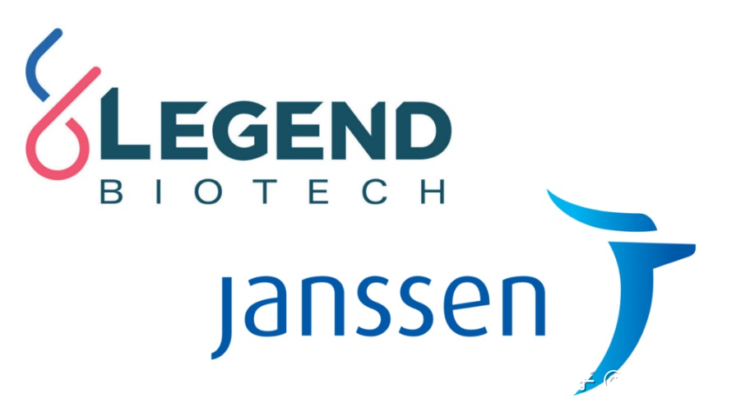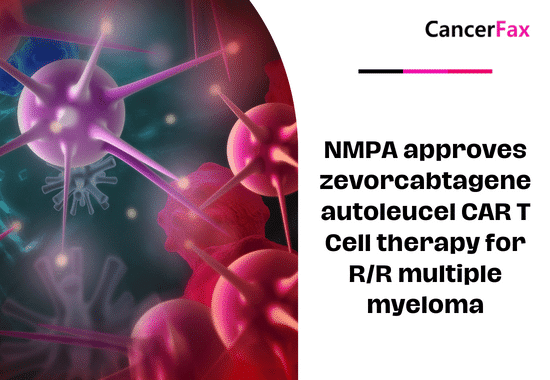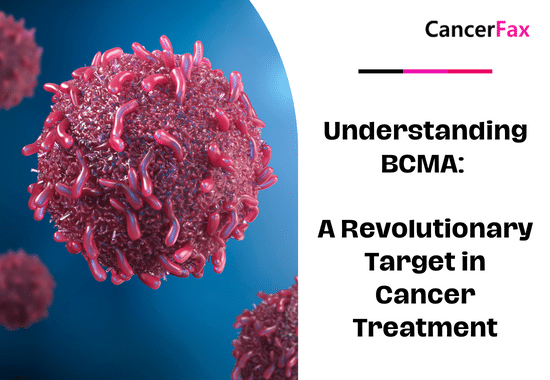JANUARY 27, 2023—Legend Biotech Corporation (NASDAQ: LEGN) (Legend Biotech), a global biotechnology company developing, manufacturing and commercializing novel therapies to treat life-threatening diseases, announced today that CARTITUDE-4, the Phase 3 study evaluating CARVYKTI® (ciltacabtagene autoleucel; cilta-cel) for the treatment of adult patients with relapsed and lenalidomide-refractory multiple myeloma, met its primary endpoint of showing a statistically significant improvement in progression-free survival (PFS) compared to standard therapy at the study’s first pre-specified interim analysis. The study has been unblinded following the recommendation of an independent data monitoring committee.
The CARTITUDE-4 (NCT04181827) study is the first international, randomized, open-label Phase 3 study evaluating the efficacy and safety of a CAR-T therapy versus pomalidomide, bortezomib and dexamethasone (PVd) or daratumumab, pomalidomide and dexamethasone (DPd) in adult patients with relapsed and lenalidomide-refractory multiple myeloma who received one to three prior lines of therapy.
The primary endpoint of the study is PFS. Secondary endpoints include safety, overall survival (OS), minimal residual disease (MRD) negative rate and overall response rate (ORR). Patients will continue to be followed for primary and secondary endpoints as part of the CARTITUDE-4 study.
“Autologous CAR-T cell therapy represents a major breakthrough in cancer treatment, and topline results from CARTITUDE-4 support our continuous efforts to bring this treatment option to patients with бир нече Myeloma in various stages of disease progression,” Lida Pacaud, M.D., Vice President of Clinical Development and Medical Affairs at Legend Biotech, said.
Results from the CARTITUDE-4 study will be submitted to an upcoming medical meeting and will support discussions with health authorities about potential regulatory submissions.
CARVYKTI® КӨРСӨТМӨЛӨР ЖАНА КОЛДОНУУ
CARVYKTI® (цилтакабтаген аутолеуцел) is a B-cell maturation antigen (BCMA)-directed genetically modified autologous T cell иммунотерапия indicated for the treatment of adult patients with relapsed or refractory multiple myeloma, after four or more prior lines of therapy, including a proteasome inhibitor, an immunomodulatory agent, and an anti-CD38 monoclonal antibody.
ЭСКЕРТҮҮЛӨР ЖАНА САКТОО
CYTOKINE RELEASE SYNDROME (CRS) including fatal or life-threatening reactions, occurred following treatment with CARVYKTI® in 95% (92/97) of patients receiving ciltacabtagene autoleucel. Grade 3 or higher CRS (2019 ASTCT grade) occurred in 5% (5/97) of patients, with Grade 5 CRS reported in 1 patient. The median time to onset of CRS was 7 days (range: 1‑12 days). The most common manifestations of CRS included pyrexia (100%), hypotension (43%), increased aspartate aminotransferase (AST) (22%), chills (15%), increased alanine aminotransferase (ALT) (14%) and sinus tachycardia (11%). Grade 3 or higher events associated with CRS included increased AST and ALT, hyperbilirubinemia, hypotension, pyrexia, hypoxia, respiratory failure, acute kidney injury, disseminated intravascular coagulation, HLH/MAS, angina pectoris, supraventricular and ventricular tachycardia, malaise, myalgias, increased C‑reactive protein, ferritin, blood alkaline phosphatase and gamma-glutamyl transferase.
Клиникалык көрсөтүүнүн негизинде CRS аныктоо. Температуранын, гипоксиянын жана гипотониянын башка себептерин баалоо жана дарылоо. CRS HLH/MAS табылгалары менен байланыштуу деп билдирди жана синдромдордун физиологиясы бири-бирине дал келиши мүмкүн. HLH/MAS өмүргө коркунуч туудурган абал. дарылоого карабастан CRS же отко чыдамдуу CRS прогрессивдүү симптомдору менен ооруган, HLH / MAS далилдер үчүн баалоо.
Sixty-nine of 97 (71%) patients received tocilizumab and/or a corticosteroid for CRS after infusion of ciltacabtagene autoleucel. Forty-four (45%) patients received only tocilizumab, of whom 33 (34%) received a single dose and 11 (11%) received more than one dose; 24 patients (25%) received tocilizumab and a corticosteroid, and one patient (1%) received only corticosteroids. Ensure that a minimum of two doses of tocilizumab are available prior to infusion of CARVYKTI®.
Monitor patients at least daily for 10 days following CARVYKTI® infusion at a REMS-certified healthcare facility for signs and symptoms of CRS. Monitor patients for signs or symptoms of CRS for at least 4 weeks after infusion. At the first sign of CRS, immediately institute treatment with supportive care, tocilizumab, or tocilizumab and corticosteroids.
КРСтин белгилери же симптомдору каалаган убакта пайда болгондо дароо медициналык жардамга кайрылууну бейтаптарга кеңеш бериңиз.
NEUROLOGIC TOXICITIES, which may be severe, life-threatening or fatal, occurred following treatment with CARVYKTI®. Neurologic toxicities included ICANS, neurologic toxicity with signs and symptoms of parkinsonism, Guillain-Barré Syndrome, peripheral neuropathies, and cranial nerve palsies. Counsel patients on the signs and symptoms of these neurologic toxicities, and on the delayed nature of onset of some of these toxicities. Instruct patients to seek immediate medical attention for further assessment and management if signs or symptoms of any of these neurologic toxicities occur at any time.
Жалпысынан, төмөндө сүрөттөлгөн нейрологиялык уулуулуктун бир же бир нече субтиптери 26% (25/97) пациенттерде cilacabtagene autoleucel кийин пайда болгон, анын ичинен 11% (11/97) бейтаптардын 3-даражадагы же андан жогору окуяларды башынан өткөргөн. Нейрологиялык ууландыргычтыктын бул субтиптери эки уланып жаткан изилдөөдө да байкалган.
Immune Effector Cell-Associated Neurotoxicity Syndrome (ICANS): Patients may experience fatal or life-threatening ICANS following treatment with CARVYKTI®, including before CRS onset, concurrently with CRS, after CRS resolution, or in the absence of CRS. ICANS occurred in 23% (22/97) of patients receiving ciltacabtagene autoleucel including Grade 3 or 4 events in 3% (3/97) and Grade 5 (fatal) events in 2% (2/97). The median time to onset of ICANS was 8 days (range 1-28 days). All 22 patients with ICANS had CRS. The most frequent (≥5%) manifestation of ICANS included encephalopathy (23%), aphasia (8%) and headache (6%).
Monitor patients at least daily for 10 days following CARVYKTI® infusion at the REMS‑certified healthcare facility for signs and symptoms of ICANS. Rule out other causes of ICANS symptoms. Monitor patients for signs or symptoms of ICANS for at least 4 weeks after infusion and treat promptly. Neurologic toxicity should be managed with supportive care and/or corticosteroids as needed.
Parkinsonism: Of the 25 patients in the CARTITUDE-1 study experiencing any neurotoxicity, five male patients had neurologic toxicity with several signs and symptoms of parkinsonism, distinct from immune effector cell-associated neurotoxicity syndrome (ICANS). Neurologic toxicity with parkinsonism has been reported in other ongoing trials of ciltacabtagene autoleucel. Patients had parkinsonian and non-parkinsonian symptoms that included tremor, bradykinesia, involuntary movements, stereotypy, loss of spontaneous movements, masked facies, apathy, flat affect, fatigue, rigidity, psychomotor retardation, micrographia, dysgraphia, apraxia, lethargy, confusion, somnolence, loss of consciousness, delayed reflexes, hyperreflexia, memory loss, difficulty swallowing, bowel incontinence, falls, stooped posture, shuffling gait, muscle weakness and wasting, motor dysfunction, motor and sensory loss, akinetic mutism, and frontal lobe release signs. The median onset of parkinsonism in the 5 patients in CARTITUDE-1 was 43 days (range 15-108) from infusion of ciltacabtagene autoleucel.
Monitor patients for signs and symptoms of parkinsonism that may be delayed in onset and managed with supportive care measures. There is limited efficacy information with medications used for the treatment of Parkinson’s disease, for the improvement or resolution of parkinsonism symptoms following CARVYKTI® дарылоо.
Guillain-Barré синдрому: Guillain-Barré синдрому (GBS) кийинки өлүмгө алып келген натыйжасы тамырга иммуноглобулиндер менен дарылоо карабастан, ciltacabtagene autoleucel дагы бир уланып жаткан изилдөө пайда болду. Миллер-Фишердин GBS вариантына дал келген симптомдор, энцефалопатия, кыймылдын алсыздыгы, сүйлөөнүн бузулушу жана полирадикулоневрит.
GBS үчүн монитор. GBS үчүн перифериялык нейропатия менен кайрылган бейтаптарды баалоо. GBS оордугуна жараша, колдоо чаралары менен жана иммуноглобулиндер жана плазма алмашуу менен бирге дарылоону карап көрөлү.
Peripheral Neuropathy: Six patients in CARTITUDE-1 developed peripheral neuropathy. These neuropathies presented as sensory, motor or sensorimotor neuropathies. Median time of onset of symptoms was 62 days (range 4-136 days), median duration of peripheral neuropathies was 256 days (range 2-465 days) including those with ongoing neuropathy. Patients who experienced peripheral neuropathy also experienced cranial nerve palsies or GBS in other ongoing trials of ciltacabtagene autoleucel.
Баш сөөк нервинин шал оорусу: CARTITUDE‑3.1де үч бейтап (1%) баш нервинин шал оорусун баштан кечирген. Үч бейтаптын тең 7-краниалдык нерв шал оорусу болгон; бир пациенттин 5-баш нервинин шал оорусу да болгон. Кылкаабтагене аутолейцелдин инфузиясынан кийин башталганга чейинки орточо убакыт 26 күндү (диапазон 21-101 күн) түзгөн. Cilcaabtagene autoleucelдин уланып жаткан сыноолорунда 3-жана 6-баш сөөк нервинин шал оорусунун, эки тараптуу 7-баш нервинин шал оорусунун пайда болушу, жакшыргандан кийин баш сөөк нервинин шал оорусунун начарлашы жана баш сөөк нервинин шал оорусу менен ооруган бейтаптарда перифериялык нейропатиянын пайда болушу да билдирилди. Баш сөөк нервинин шал оорусунун белгилери жана симптомдору үчүн бейтаптарды көзөмөлдөңүз. Белгилердин жана симптомдордун оордугуна жана прогрессине жараша системалуу кортикостероиддер менен башкарууну карап көрүңүз.
HEMOPHAGOCYTIC LYMPHOHISTIOCYTOSIS (HLH)/MACROPHAGE ACTIVATION SYNDROME (MAS): Fatal HLH occurred in one patient (1%), 99 days after ciltacabtagene autoleucel. The HLH event was preceded by prolonged CRS lasting 97 days. The manifestations of HLH/MAS include hypotension, hypoxia with diffuse alveolar damage, coagulopathy, cytopenia, and multi-organ dysfunction, including renal dysfunction. HLH is a life-threatening condition with a high mortality rate if not recognized and treated early. Treatment of HLH/MAS should be administered per institutional standards.
CARVYKTI® REMS: Because of the risk of CRS and neurologic toxicities, CARVYKTI® is available only through a restricted program under a Risk Evaluation and Mitigation Strategy (REMS) called the CARVYKTI® REMS.
PROLONGED AND RECURRENT CYTOPENIAS: Patients may exhibit prolonged and recurrent cytopenias following lymphodepleting chemotherapy and CARVYKTI® infusion. One patient underwent autologous stem cell therapy for hematopoietic reconstitution due to prolonged thrombocytopenia.
CARTITUDE-1де бейтаптардын 30% (29/97) узакка созулган 3 же 4-даражадагы нейтропенияны жана 41% (40/97) бейтаптардын 3 же 4-даражадагы узакка созулган тромбоцитопениясын баштан кечиришкен, алар cilcaabtagene аутолейцел инфузиясынан кийин 30-күнү чечилген эмес.
Кайталануучу 3 же 4-даражадагы нейтропения, тромбоцитопения, лимфопения жана анемия 63% (61/97), 18% (17/97), 60% (58/97) жана 37% (36/97) айыккандан кийин байкалган. инфузиядан кийинки 3 же 4-даражадагы баштапкы цитопения. 60-күндөн кийин cilcaabtagene autoleucel инфузиясынан кийин, бейтаптардын 31%, 12% жана 6% 3 же 3-даражадагы цитопенияны калыбына келтиргенден кийин, тиешелүүлүгүнө жараша 4-даражадагы лимфопения, нейтропения жана тромбоцитопениянын рецидивине ээ болгон. Бейтаптардын сексен жети пайызында (84/97) 3 же 4-даражадагы цитопения айыккандан кийин 3 же 4-даражадагы цитопениялардын бир, эки же үч же андан көп рецидивдери болгон. Алты жана 11 бейтап өлүм учурунда тиешелүүлүгүнө жараша 3 же 4-даражадагы нейтропения жана тромбоцитопения болгон.
Monitor blood counts prior to and after CARVYKTI® infusion. Manage cytopenias with growth factors and blood product transfusion support according to local institutional guidelines.
ИНФЕКЦИЯЛАР: CARVYKTI® should not be administered to patients with active infection or inflammatory disorders. Severe, life-threatening or fatal infections occurred in patients after CARVYKTI® демдөө.
Инфекциялар (бардык даражалар) 57 (59%) бейтапта болгон. 3 же 4-даражадагы инфекциялар бейтаптардын 23%ында (22/97) кездешкен; 3-4-даражадагы инфекциялар аныкталбаган патоген менен 17%, вирустук инфекциялар 7%, бактериялык инфекциялар 1% жана грибоктук инфекциялар 1% оорулуулар. Жалпысынан төрт бейтапта 5-даражадагы инфекциялар болгон: өпкө абсцесси (n=1), сепсис (n=2) жана пневмония (n=1).
Monitor patients for signs and symptoms of infection before and after CARVYKTI® infusion and treat patients appropriately. Administer prophylactic, pre-emptive and/or therapeutic antimicrobials according to the standard institutional guidelines. Febrile neutropenia was observed in 10% of patients after ciltacabtagene autoleucel infusion, and may be concurrent with CRS. In the event of febrile neutropenia, evaluate for infection and manage with broad-spectrum antibiotics, fluids and other supportive care, as medically indicated.
Вирустун кайра активдешүүсү: Гепатит В вирусунун (HBV) кайра активдешүүсү, кээ бир учурларда фульминанттуу гепатитке, боордун жетишсиздигине жана өлүмгө алып келет, гипогаммаглобулинемия менен ооруган бейтаптарда пайда болушу мүмкүн. Клеткаларды өндүрүү үчүн чогултуу алдында клиникалык көрсөтмөлөргө ылайык клиникалык жактан көрсөтүлгөн болсо, Цитомегаловирус (CMV), HBV, гепатит С вирусу (HCV) жана адамдын иммундук жетишсиздигинин вирусу (ВИЧ) же башка инфекциялык агенттерге скринингди жүргүзүңүз. Жергиликтүү институттук көрсөтмөлөргө/клиникалык практикага ылайык вирустун кайра активдешүүсүн алдын алуу үчүн антивирустук терапияны карап көрүңүз.
HYPOGAMMAGLOBULINEMIA was reported as an adverse event in 12% (12/97) of patients; laboratory IgG levels fell below 500 mg/dL after infusion in 92% (89/97) of patients. Monitor immunoglobulin levels after treatment with CARVYKTI® and administer IVIG for IgG <400 mg/dL. Manage per local institutional guidelines, including infection precautions and antibiotic or antiviral prophylaxis.
Use of Live Vaccines: The safety of immunization with live viral vaccines during or following CARVYKTI® treatment has not been studied. Vaccination with live virus vaccines is not recommended for at least 6 weeks prior to the start of lymphodepleting chemotherapy, during CARVYKTI® treatment, and until immune recovery following treatment with CARVYKTI®.
HYPERSENSITIVITY REACTIONS have occurred in 5% (5/97) of patients following ciltacabtagene autoleucel infusion. Serious hypersensitivity reactions, including anaphylaxis, may be due to the dimethyl sulfoxide (DMSO) in CARVYKTI®. Patients should be carefully monitored for 2 hours after infusion for signs and symptoms of severe reaction. Treat promptly and manage appropriately according to the severity of the hypersensitivity reaction.
SECONDARY MALIGNANCIES: Patients may develop secondary malignancies. Monitor life-long for secondary malignancies. In the event that a secondary malignancy occurs, contact Janssen Biotech, Inc., at 1-800-526-7736 for reporting and to obtain instructions on collection of patient samples for testing of secondary malignancy of T cell origin.
EFFECTS ON ABILITY TO DRIVE AND USE MACHINES: Due to the potential for neurologic events, including altered mental status, seizures, neurocognitive decline, or neuropathy, patients are at risk for altered or decreased consciousness or coordination in the 8 weeks following CARVYKTI® infusion. Advise patients to refrain from driving and engaging in hazardous occupations or activities, such as operating heavy or potentially dangerous machinery during this initial period, and in the event of new onset of any neurologic toxicities.
ADVERSE REACACIONS
Эң кеңири таралган лабораториялык эмес жагымсыз реакциялар (20% дан жогору) пирексия, цитокиндерди бөлүп чыгаруу синдрому, гипогаммаглобулинемия, гипотензия, таяныч-кыймыл аппаратынын оорушу, чарчоо, аныкталбаган патогендик инфекциялар, жөтөл, чыйрыгуу, диарея, жүрөк айлануу, энцефалопатия, энцефалопатия. дем алуу жолдорунун инфекциясы, баш оору, тахикардия, баш айлануу, диспноэ, шишик, вирустук инфекциялар, коагулопатия, ич катуу жана кусуу. Эң кеңири таралган лабораториялык терс реакцияларга (чачылышы 50%дан жогору же барабар) тромбоцитопения, нейтропения, анемия, аминотрансферазанын жогорулашы жана гипоальбуминемия кирет.
CAR T-Cell терапиясы кандын рактын айрым түрлөрүн дарылоонун эң жаңы ыкмаларынын бири болуп саналат. 750дөн ашууну уланууда клиникалык сыноолор in Кытайдагы CAR T-Cell терапиясы азыркы учурда. Жазылууну каалаган бейтаптар байланышса болот CancerFax WhatsApp аркылуу бейтаптардын ишеним телефону + 91 96 1588 1588 же электрондук почта info@cancerfax.com.
Please read full дайындоо жөнүндө маалымат including Boxed Warning for CARVYKTI®.
ABOUT CARVYKTI® (CILTACABTAGENE AUTOLEUCEL; CILTA-CEL)
Ciltacabtagene autoleucel is a BCMA-directed, genetically modified autologous T-cell immunotherapy, which involves reprogramming a patient’s own T-cells with a transgene encoding a chimeric antigen receptor (CAR) that identifies and eliminates cells that express BCMA. BCMA is primarily expressed on the surface of malignant multiple myeloma B-lineage cells, as well as late-stage B-cells and plasma cells. The cilta-cel CAR protein features two BCMA-targeting single domain antibodies designed to confer high avidity against human BCMA. Upon binding to BCMA-expressing cells, the CAR promotes T-cell activation, expansion, and elimination of target cells.[1]
In December 2017, Legend Biotech entered into an exclusive worldwide license and collaboration agreement with Janssen Biotech, Inc. (Janssen) to develop and commercialize cilta-cel.
In February 2022, cilta-cel was approved by the U.S. Food and Drug Administration (FDA) under the brand name CARVYKTI® for the treatment of adults with relapsed or refractory multiple myeloma. In May 2022, the European Commission (EC) granted conditional marketing authorization of CARVYKTI® for the treatment of adults with relapsed and refractory multiple myeloma.[3] In September 2022, Japan’s Ministry of Health, Labour and Welfare (MHLW) approved CARVYKTI®.[4] Cilta-cel was granted Breakthrough Therapy Designation in the U.S. in December 2019 and in China in August 2020. In addition, cilta-cel received a PRIority MEdicines (PRIME) designation from the European Commission in April 2019. Cilta-cel also received Orphan Drug Designation from the U.S. FDA in February 2019, from the European Commission in February 2020, and from the Pharmaceuticals and Medicinal Devices Agency (PMDA) in Japan in June 2020. In March 2022, the European Medicines Agency’s Committee for Orphan Medicinal Products recommended by consensus that the orphan designation for cilta-cel be maintained on the basis of clinical data demonstrating improved and sustained complete response rates following treatment.
КӨП МИЕЛОМА ЖӨНҮНДӨ
Көп миелома айыккыс кан рагы that starts in the bone marrow and is characterized by an excessive proliferation of plasma cells. In 2023, it is estimated that more than 35,000 people will be diagnosed with multiple myeloma, and more than 12,000 people will die from the disease in the U.S. While some patients with multiple myeloma have no symptoms at all, most patients are diagnosed due to symptoms that can include bone problems, low blood counts, calcium elevation, kidney problems or infections.[8] Although treatment may result in remission, unfortunately, patients will most likely relapse. Patients who relapse after treatment with standard therapies, including protease inhibitors, immunomodulatory agents, and an anti-CD38 monoclonal antibody, have poor prognoses and few treatment options available.
[1] CARVYKTI™ Prescribing Information. Horsham, PA: Janssen Biotech, Inc.
[2] CARVYKTI™ (ciltacabtagene autoleucel), BCMA-Directed CAR-T Therapy, Receives U.S. FDA Approval for the Treatment of Adult Patients with Relapsed or Refractory Multiple Myeloma. Available at: https://legendbiotech.com/legend-news/carvykti-ciltacabtagene-autoleucel-bcma-directed-car-t-therapy-receives-u-s-fda-approval-for-the-treatment-of-adult-patients-with-relapsed-or-refractory-multiple-myeloma/. Accessed October 2022.
[3] CARVYKTI (ciltacabtagene autoleucel) Granted Conditional Approval by the European Commission for the Treatment of Patients with Relapsed and Refractory Multiple Myeloma. Available at: https://legendbiotech.com/legend-news/carvykti-ciltacabtagene-autoleucel-granted-conditional-approval-by-the-european-commission-for-the-treatment-of-patients-with-relapsed-and-refractory-multiple-myeloma/. Accessed October 2022.
[4] CARVYKTI™ (ciltacabtagene autoleucel) Receives Approval from Japan’s Ministry of Health, Labour and Welfare (MHLW) for the Treatment of Patients with Relapsed or Refractory Multiple Myeloma. Available at: https://www.businesswire.com/news/home/20220926005847/en/CARVYKTI%E2%84%A2-ciltacabtagene-autoleucel-Receives-Approval-from-Japan%E2%80%99s-Ministry-of-Health-Labour-and-Welfare-MHLW-for-the-Treatment-of-Patients-with-Relapsed-or-Refractory-Multiple-Myeloma. Accessed October 2022.
[5] European Commission. Community Register of Orphan Medicinal Products. Available at: https://ec.europa.eu/health/documents/community-register/html/o2252.htm. Accessed October 2022.
[6] American Society of Clinical Oncology. Multiple myeloma: introduction. https://www.cancer.net/cancer- types/multiple-myeloma/introduction. Accessed October 2022.
[7] American Cancer Society. “Key Statistics About Multiple Myeloma.” Available at: https://www.cancer.org/cancer/multiple-myeloma/about/key-statistics.html#:~:text=Multiple%20myeloma%20is%20a%20relatively,men%20and%2015%2C370%20in%20women). Accessed January 2023.
[8] American Cancer Society. Multiple myeloma: early detection, diagnosis and staging. https://www.cancer.org/content/dam/CRC/PDF/Public/8740.00.pdf. Accessed October 2022.
[9] Rajkumar SV. Multiple myeloma: 2020 update on diagnosis, risk-stratification and management. Am J Hematol. 2020;95(5),548-567. doi:10.1002/ajh.25791.
[10] Kumar SK, Dimopoulos MA, Kastritis E, et al. Natural history of relapsed myeloma, refractory to immunomodulatory drugs and proteasome inhibitors: a multicenter IMWG study. Leukemia. 2017;31(11):2443- 2448.
[11] Gandhi UH, Cornell RF, Lakshman A, et al. Outcomes of patients with multiple myeloma refractory to CD38- targeted monoclonal antibody therapy. Leukemia. 2019;33(9):2266-2275.
LEGEND BIOTECH ЖӨНҮНДӨ
Legend Biotech is a global biotechnology company dedicated to treating, and one day curing, life-threatening diseases. Headquartered in Somerset, New Jersey, we are developing advanced cell therapies across a diverse array of technology platforms, including autologous and allogeneic chimeric antigen receptor T-cell, gamma-delta T cell (gd T) and natural killer (NK) cell-based immunotherapy. From our three R&D sites around the world, we apply these innovative technologies to pursue the discovery of safe, efficacious and cutting-edge therapeutics for patients worldwide.


